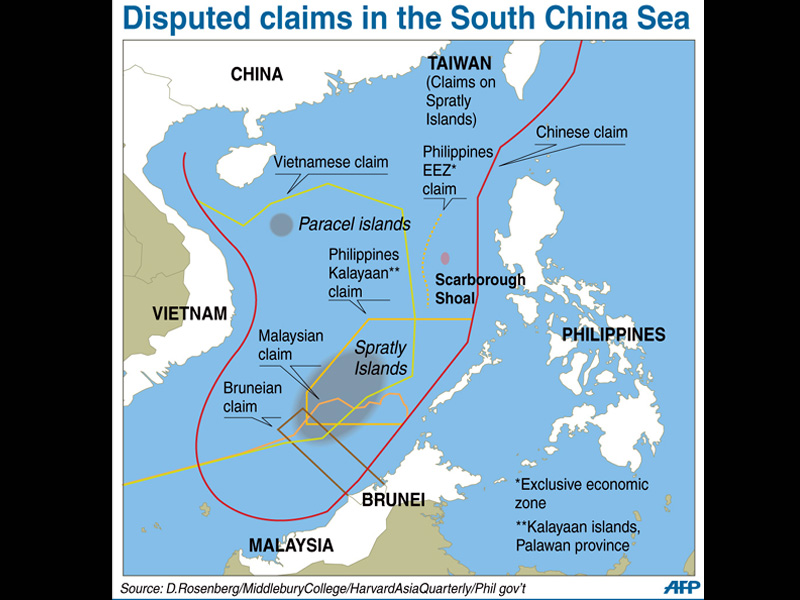UN tribunal ‘totally ignored’ China’s 9-dash line – Carpio

Map showing the disputed areas in the West Philippine Sea (south China Sea), including the Spratlys Islands and Scarborough Shoal. AFP
SUPREME Court Justice Antonio Carpio said the United Nations-backed International Arbitral Tribunal practically ignored China’s nine-dash line in its latest ruling recognizing jurisdiction on the West Philippine Sea (South China Sea) dispute.
In a forum on the maritime dispute on Thursday night, Carpio said the tribunal did not consider China’s nine-dash line, within which China claimed most parts of the West Philippine Sea, in its initial decision to take jurisdiction of the case.
Carpio said the fact that the tribunal chose to ignore China’s dash line, its most prominent evidence to show its historic right over the waters, gives a “peek” of its final decision on the dispute.
“The nine dash line was totally ignored by the tribunal… That is an indication of how they will rule. The nine dash line will have no meaning at all,” Carpio said in the forum attended by journalists, historians and seasoned lawyers.
“I was just trying to give you a peek onto the mind of the tribunal. They don’t really consider the dash line as material in determining exclusive economic zone. There is no such thing as a nine-dash line under UNCLOS,” Carpio said.
Carpio said the tribunal assumed jurisdiction of the case because the claim does not involve any sovereignty or sea boundary delimitation.
The Philippines scored a victory at the international Arbitral Tribunal after the panel unanimously decided that it has jurisdiction over the maritime dispute between China and the Philippines involving parts of the South China Sea (West Philippine Sea).
The decision means that the tribunal, convened under the provisions of the United Nations Convention on the Law of the Sea (UNCLOS), will hold further hearings to settle the increasingly contentious dispute.
The Philippines claimed that it has full maritime entitlement in the West Philippine Sea, and that China’s nine-dash line is invalid under the UNCLOS because it overlaps on the country’s exclusive economic zone (EEZ) and extended continental shelf (ECS).
The UNCLOS is the primary international law which governs maritime disputes on overlapping maritime zones. However, UNCLOS does not govern territorial disputes, which are sovereignty or ownership issues over land territory.
A nine-page press release issued by the Permanent Court of Arbitration “on behalf of the Arbitral Tribunal in the Philippines v. China arbitration” clarified that the dispute was not about sovereignty, as China has claimed.
“This arbitration concerns the role of ‘historic rights’ and the source of maritime entitlements in the South China Sea, the status of certain maritime features in the South China Sea and the maritime entitlements they are capable of generating, and the lawfulness of certain actions by China in the South China Sea that are alleged by the Philippines to violate the Convention,” it said.
The panel concluded that it had jurisdiction over the case.
“The Tribunal’s Award of today’s date is unanimous and concerns only whether the Tribunal has jurisdiction to consider the Philippines’ claims and whether such claims are admissible. The Award does not decide any aspect of the merits of the Parties’ dispute. In its Award, the Tribunal has held that both the Philippines and China are parties to the Convention and bound by its provisions on the settlement of disputes.”
“The Tribunal has also held that China’s decision not to participate in these proceedings does not deprive the Tribunal of jurisdiction and that the Philippines’ decision to commence arbitration unilaterally was not an abuse of the Convention’s dispute settlement procedures,” the panel said.
The tribunal expects to “render its Award on the merits and remaining jurisdictional issues in 2016.”
China has maintained that it would not follow the tribunal’s orders in relation to the case, and that the ruling was null and void because it does not bind China.
But Carpio said he thinks China would eventually follow because it would be more advantageous for it to comply with the tribunal.
“Over 95 percent of decisions of the tribunal were complied with in the end. It took some time. When the cost of noncompliance far exceeds the cost of compliance, the state will comply,” Carpio said.
Carpio said it is more advantageous for China to comply because even an economic giant like China needs to preserve its ties with other countries in the Asean region and even “the rest of the world.”
“In the end, China will comply, I think, because it’s his advantage to comply. It would take time once we win, do not expect instant gratification. We’ll have another struggle to convince the world to support us,” Carpio said.
China asserts it has “indisputable sovereignty” and “historic rights” to nearly the entire South China Sea using its “nine-dash line” claim that overlaps with the UNCLOS-mandated 200-nautical-mile Exclusive Economic Zone (EEZ).
Amid the maritime and territorial spat, China has conducted massive land reclamation activities turning submerged reefs into artificial islands capable of hosting military equipment and structures.
RELATED STORIES:
Key points of the Arbitral Tribunal’s decision in PH vs China case